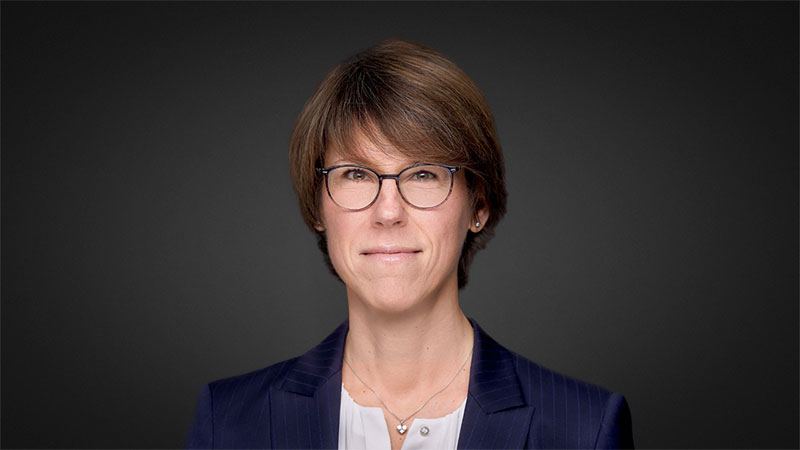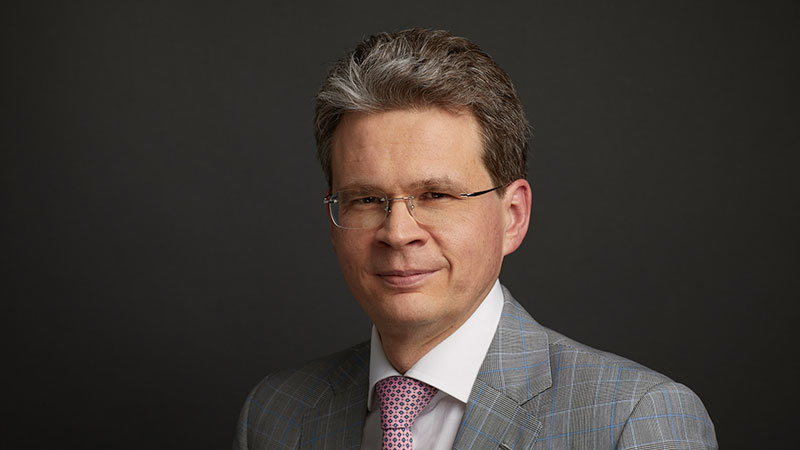New world, new opportunities

How to invest in a world that’s been turned on its head? Inflation rates are soaring, interest rates are rising, and war has brought human tragedy, supply-chain disruptions and an energy crisis. While this new world may not look so hopeful, portfolio managers from Vontobel give their take on why investors should keep investing and where. This article summarizes the opinions shared at a recent Vontobel Investment Conference by Michel Salden and Kerstin Hottner on commodities, Ramiz Chelat on equities, Thomas Schaffner on mtx equities and Wouter van Overfelt on emerging markets corporate bonds.
Don’t stop moving
It's been said that investing is like breathing – you can’t just stop. This means, even with a long list of concerns weighing on investors’ minds, complacency is probably not the best strategy right now. Diversification is one way to shore up investment portfolios in the face of a changing risk landscape. But are there also opportunities amid the risk? We asked our portfolio managers, whose expertise spans across various asset classes, for their views:
Commodities with Michel Salden and Kerstin Hottner
“There’s a need to diversify portfolios and commodities have proven to be a strong diversifier,” says Michel Salden, Vontobel’s senior portfolio manager for commodities. “This is because the new environment, characterized by inflationary pressures and rising interest rates, has been prompted by a rise in commodity prices.”
→ We’re entering a different phase for the commodities sector after years of underperformance, meaning it’s fared worse and yielded less return than the broader market, in part because the US was releasing a lot of shale oil and gas. This kept inflation under control and allowed central banks to run negative interest rates in the previous decade. But nowadays, the world is running out of commodity production capacity, while demand is going to increase. The inflationary pressure we are observing will be with us for a while.
→ Emerging markets are becoming the key drivers for commodities in the next 20 years – a fact that doesn’t yet seem to have sunk in with EU- and US-based investors.
“The demand shock coming is going to be enormous: Energy demand coming from emerging markets is set to double in the next two decades, and the rising middle class in emerging markets means they’re going to consume more,” says Kerstin Hottner, Vontobel’s fund manager for commodities. “As long as nobody is willing to invest in production capacity, keeping inventory levels low, we’ll continue to see volatility in commodity markets.”
→ High energy prices have a spillover effect into agricultural markets, as produce production is linked to diesel prices and fertilizer prices are dependent on natural gas. We’re also already seeing the effect of higher energy prices in the metals market. Smelting is a very energy-intense production process and some aluminum and zinc smelters are already shutting down because of it. The end result is a lower supply and therefore a deficit, which is already the case for many metals. From 2025 onwards, we may see the deficit intensify, and that will mean that the world will need higher metal prices to incentivize more production going forward.
→ While some people envision that the energy transition will mean we all are driving electric vehicles, it’s a bit of a misconception. That’s a more likely scenario in industrialized countries, where there will be less demand for oil, but it’s expected that oil and gas demand will only continue to grow in emerging markets.
→ One thing to remember is that the energy transition – the transition from fossil fuels towards low-carbon energy – is metals intense. The world will need copper for the grids, steel and aluminum for the wind and solar parks, but also to build electric vehicles – which require 7-10x more metals to be built than conventional cars. Metals are expected to suffer from a very intense supply deficit from the mid-2020s onwards.
- Commodities offer some interesting investing ideas. As the world grapples with a commodities production deficit, demand for commodities is set to increase.
- Across equities and emerging market corporate bonds, market volatility means that investors opting for active management have the opportunity to make the most of the turmoil. That’s because they’re not bogged down by how indexes perform and can pick assets according to the quality they bring to portfolios.
Equities with Ramiz Chelat
→ The last five years have been marked by tremendous growth in passive investment. It was a time in which the US Federal Reserve pumped a lot of liquidity into the market, rates were low and even zero. Those conditions boosted equity markets globally, as investors sought riskier investments to secure higher returns. But now market conditions are shifting and we’re seeing raising rates and the momentum-driven markets are changing.
→ It’s important to consider that when you look at an index, like for example the S&P 500 Index or the Nasdaq Composite Index, it’s a market cap-weighted composition that doesn’t necessarily reflect the quality of the companies that are included in the index. Simply put, just because a firm is big enough to make it into the index doesn’t necessarily mean it’s well-equipped to protect earnings and margin growth in times of uncertainty. They’re in the index for size reasons, not necessarily quality reasons.
“Going forward, index investing may become a riskier proposition,” says Ramiz Chelat, Vontobel’s portfolio manager for equities. “Investors might want to consider focusing on high-quality businesses that can grow at attractive rates over the long term.”
→ Investors are telling us they’re worried about inflation. If this is where you find yourself, pricing power and the strength of brand of companies you’re investing in is critical, especially in a slowing environment. One key aspect is premiumization – getting consumers to splurge more for brands or products, by upgrading a product to be more exclusive or innovative, for instance. Those companies that have been pushing this strategy within their brand portfolios are in a better position to handle inflation. Higher inflation is also leading to higher interest rates and therefore increased costs of capital. So, investors need to ensure they are not paying too much for companies that might end up not growing their earnings as much as they expect them to.
→ The overarching economic backdrop is one of slower growth globally, especially in the US and Europe, because that’s also where interest rates are rising quicker and inflation risks are currently higher. The situation is more nuanced in emerging markets, where we see a selection of markets with accelerating growth, including India, Indonesia and Brazil.
→ Deglobalization is a current hot topic and, if it happens, it’s going to occur as a long-term protracted trend. Dismantling the concentration of supply chains in China and shifting them into neighboring Asian countries or Mexico will be difficult, but we’re seeing companies making gradual shifts toward it. As these markets are typically higher cost, wage inflation is rising and creating an upward pressure on inflation over the long term, which further supply chain disruptions will only compound.
How to ensure you’re not paying too much for companies that may not deliver on earnings growth expectations? When inflation is a concern, looking at pricing power and the strength of brand of companies is critical, especially in a slowing environment. Companies that have been pushing the strategy of premiumization within their brand portfolios are in a better position to handle inflation.
mtx Equities with Thomas Schaffner
→ The current market environment is volatile, providing active investors with opportunities as they are able to quickly adjust to changes and even take advantage of them.
→ The Covid situation in China remains difficult, and it’s a key concern for investors as it has wider implications on the economy. China’s central bank has been relatively proactive and already started to tighten monetary policy last year. So now, as the economy slows, the Chinese central bank currently has more tools available to support the economy compared with central banks in the West, including interest rate cuts, liquidity injections and cuts in the reserve requirement ratio for banks.
→ Policies in China have already become quite supportive, both on the regulatory and monetary side. However, the impact is limited because Covid is still a threat hanging over the economy.
“A reopening of the economy or further policies aimed at spurring economic growth should serve as a catalyst for investors to become more bullish on China,” says Thomas Schaffner, Vontobel’s senior portfolio manager for mtx equities.
Emerging markets corporate bonds with Wouter van Overfelt
→ There’s a lot to gain for active management in times of volatility, as they are able to quickly adjust to changes and even take advantage of the best market opportunities.
→ Today, the world is very different to how it was over the past decade, which was marked by falling interest rates with quantitative easing, which means central banks bought financial assets, like government bonds, with the aim of boosting liquidity in the financial system. Today, we have a more inflationary environment, where central banks are raising rates and that creates a new dynamic for investors as they will need to rebalance their portfolios to protect themselves from value erosion.
→ While inflation is generally not considered positive for fixed-income markets because it bites away at bonds’ face value. For emerging-markets corporate bond investors, however, there’s an opportunity to benefit from higher yields (compared to many other areas in fixed income) and therefore they offer a certain protection against that inflation-caused erosion.
→ China presents a big universe within the EM corporate bond space, and volatility there tends to be higher, which, as explained above, creates opportunity for active investors as they tend to be able to capitalize on changing environments with more nimble moves.
→ If central banks have to step up interest rate increases, this will lead to lower economic growth, which can be negative for emerging markets corporate bonds and make other developing markets more attractive to invest in.











